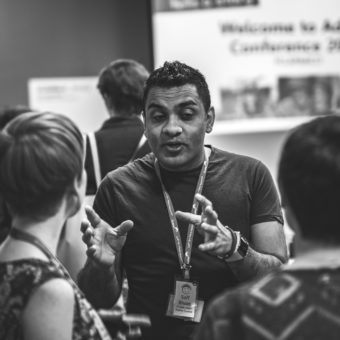
Psychologists and Cleft: A look at the Role of a Clinical Psychologist in a Cleft Team

The Role of the Clinical Psychologist
Dr Jen Rundle
Jump To:
- How do I get a referral?
- Who makes up the ‘MDT’?
- What is a clinical psychologist?
- How do clinical psychologists provide support?
- Where can I find support elsewhere?
On Saturday 8th July, Dr Kate le Marechal and I, both clinical psychologists from the South Thames Cleft Service (based at St Thomas’ Hospital) were lucky enough to be invited to speak at the inaugural CLAPA Adult Conference at the Ibis Hotel in Euston, London. We were honoured to be there and felt excited to be involved in what was shaping up to be an important and inspirational event.



There were a range of speakers, from different fields and backgrounds, and the audience was made up of a mix of professionals and patients. Our brief was to use our slot to give an overview of what sort of support is available to adults who were born with a cleft lip and/or palate and how clinical psychologists in particular work within their teams to provide support. Below is an overview of the key points we talked about.
How do I get a referral?
We began by talking about the most common routes adults take to be referred back into the service, after a hiatus from treatment. Most patients are aware that they remain under the care of their designated cleft team until they reach the age of 20. At that point, they would be discharged, unless there was a need for ongoing treatment. However, many cleft patients do not realise that they are entitled to further treatment at any age throughout adulthood. Some of the most common reasons for returning to treatment include; wishing to have dental work for either aesthetic or functional purposes, appearance concerns (regarding specific facial aspects such as a lip scar or nose, or general facial spacing or alignment), concerns about speech, a fistula which is causing discomfort, or a combination of the above. Referrals can be obtained through your local GP or dentist (who should be able to advise on the correct service according to your geographical location).
Who makes up the ‘MDT’?
MDT or ‘multidisciplinary team’ means professionals from different specialities, each with their own unique package of skills and expertise, working together to provide a holistic package of care. Most teams across the country are made up of the same combination of professionals, but some have slightly different resources. When you come for an MDT appointment, you may see some or all of these different team members. We know it can be a bit daunting coming into a room with a whole panel of faces looking at you! However, they are all equally important and may become more important at different time points, depending on your treatment needs and priorities. You are also welcome to ask for less people to be there if you are anxious or nervous, as it is often the case that trainees are also present to observe.
| Discipline | Responsible for: |
| Consultant Cleft Surgeon | Performing the cleft lip and palate repairs, together with any later surgery on bone or jaw (e.g., bone graft, speech surgery, lip/nose revision). |
| Paediatric Dentist | Taking care of the developing teeth from the baby teeth through to the permanent teeth and offering advice on diet, oral hygiene and prevention of dental disease. |
| Orthodontist | Managing the development of the teeth and jaws, specialising in positioning teeth and fitting appliances. Also, often working closely with the surgeon to prepare patients for operations. |
| Restorative Dentist | Restoring teeth to their optimal aesthetic appearance (reconstruct, reshape, replace and maintain) e.g., using implants, bridges, veneers. |
| Clinical Nurse Specialist | Offering support and information to parents at the time of diagnosis and throughout the child’s treatment and advising on feeding and other potential problems. |
| Speech and Language Therapist | Overseeing speech and language development. |
| Audiologist | Diagnosing, managing and treating issues related to hearing. |
| Geneticist | Advising patients with cleft on the chances of it being an inherited problem. |
| Clinical Psychologist | Helping the patients deal with any difficulties related to cleft. |
The surgeon will lead the consultation, with input from the other team members. Different surgeons have different specialities in terms of training and therefore different surgical procedures that they offer. For example, our service has three surgeons, so you will be allocated to a different surgeon depending on your treatment needs.
It is important to stress that the most important person in the consultation is YOU! As adults, there is no specified service protocol or pathway, which means the treatment is largely driven by what you want and what you think will best fit with your life. We realise everyone’s life experiences are unique and that what you come with in terms of feelings, thoughts, priorities, and preferences is extremely important and needs to be heard and understood by the team.
What is a clinical psychologist?
Our job title can be a tricky one to explain and many people confuse us with counsellors and psychiatrists. In essence, our main aim is to reduce distress and enhance and promote psychological well-being. Well-being can be defined as a state in which every individual realises his or her own potential, can cope with the normal stresses of life, can work productively and fruitfully, and is able to make a contribution to her or his community.
To be a called a ‘clinical psychologist’, one has to have completed a psychology degree, and completed and passed a three year clinical doctorate.
How do clinical psychologists provide support?
Like our MDT colleagues, we work directly with patients by undertaking assessments and providing tailored, patient-centred treatment. In our case, ‘treatment’ is talking therapy. We do not prescribe medication. Our training means we have knowledge of lots of different evidence-based theories and models which help us understand human experience and hopefully alleviate distress. Depending on the patient’s presenting issues, we apply a combination of models to plan an appropriate intervention (from one-off sessions to a course of regular sessions followed by follow-up sessions). We are also in a privileged position to offer flexibility about the number and timing of sessions, unlike in most other mental health settings.
We are funded primarily to support well-being around cleft and have specialised knowledge to provide specific support pertaining to cleft, but we are aware that that other separate issues may arise or be uncovered whilst undergoing treatment under our care. If we think that another service or setting would be better placed to offer help with these issues, then we do our best to communicate that, find out what the best service is, and will either refer you or signpost on. We can also liaise with other professionals to get their input to support that process indirectly. However, one could argue that cleft is linked to any problem because it is an integral part of one’s identity. This can mean one key challenge for us as psychologists is to try and disentangle what is related to cleft and what is not and sometimes, this is simply not possible.
Here is a flavor of the types of psychosocial difficulties we commonly provide support for:
- Experience of negative emotions (depression, shame, anxiety, anger)
- Low self-esteem or self-confidence
- Difficulty managing social encounters (exacerbated by communication deficits), bullying, staring or teasing
- Behavioural consequences (isolation, social withdrawal)
- Difficulty understanding or making decisions about treatment
- Anxiety related to surgery or dental treatment
A significant proportion of our time is spent being physically present in the MDT clinics. Our role here may be to help to ask questions, clarify things, act as an advocate or translator, or meet with patients before or after the appointment if concerns arise or there are other issues to discuss. Sometimes people may have the idea that you have to be ‘mad or bad’ to see a psychologist but this is not true – it is very normal to see us!
One service development idea our team is working on is to try to establish a routine treatment pathway whereby we see every new adult that is referred into our service before they are seen by the MDT, in order to discuss hopes and expectations around treatment, any concerns or questions and any useful background information that would be useful for the team to know. In our experience, a meeting like this can make your initial MDT appointment less nerve-wracking and run a bit more smoothly.
Case Study:
| Background: |
|
| What happened? |
|
| Intervention: |
|
| Outcome: |
|
Where can I find support elsewhere?
Please find some alternative support services and online resources below:
- Primary care / IAPT (Improving Access to Psychological Therapies) – CBT, counselling, groups
- Private therapy
- CLAPA: support/practical advice, peer to peer support, activity days, groups
- Social media (Facebook group)
- Family and friends
- Self-help resources
- https://www.changingfaces.org.uk/ – visible difference
- http://bos.org.uk/Public-Patients/Your-Jaw-Surgery1 – orthognathic info
- https://www.clapa.com/ – cleft specific support
- http://www.cleftline.org/parents-individuals/books/#teenadult – books about cleft
- http://www.faceitonline.org.uk/ – online support tool for people with visible difference
- http://freemindfulness.org/download – mindfulness
- https://www.ntw.nhs.uk/pic/selfhelp/ – general mental health
If you would like any further information about any points in the article above or how our service works, please don’t hesitate to contact me.
Jen Rundle, Clinical Psychologist
E-mail: [email protected]

